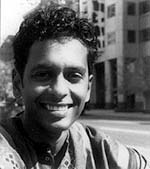
introducing readers to writers since 1995
April 20, 2005
Guest Author: Shyam Selvadurai
by Ron Hogan Shyam Selvadurai is the author of the novels Funny Boy and Cinnamon Gardens. In the essay that follows, he describes how he came to edit Story-Wallah, "an anthology of short fiction from South Asian writers," for a publisher in his hometown of Toronto. The collection is now available to American readers as a Mariner trade paperback, and includes a wide array of prominent authors, from Salman Rushdie and Michael Ondaatje to Monica Ali and Jhumpa Lahiri.
Shyam Selvadurai is the author of the novels Funny Boy and Cinnamon Gardens. In the essay that follows, he describes how he came to edit Story-Wallah, "an anthology of short fiction from South Asian writers," for a publisher in his hometown of Toronto. The collection is now available to American readers as a Mariner trade paperback, and includes a wide array of prominent authors, from Salman Rushdie and Michael Ondaatje to Monica Ali and Jhumpa Lahiri.
Stories from the Diaspora
by Shyam Selvadurai
In the fall of 2001, I was approached by Patrick Crean, the managing editor at Thomas Allen Publishers, to put together an anthology of short stories featuring South Asian writers in Canada. I proposed, instead, doing an anthology of South Asian writers from the diaspora, as this would allow me to include a number of writers I was really passionate about from North America, England, Australia, Fiji, Singapore, Malaysia, the Caribbean and Africa.Before I began reading for the anthology, I researched library databases world-wide and was surprised to find that, despite the huge interest and popularity of South Asian fiction, no one had thought to collect short stories by these writers in this way. The few anthologies I did find were limited to a single country or cultural group or gender: Indian, Pakistani, Sri Lankan, or Indo-Caribbean writers, South Asian women, and so on. No attempt had been made to bring these disparate parts together into a single anthology of literature from the South Asian disapora, despite the fact that most of the writers we consider "South Asian" are actually diasporic. I was very excited that I was about to create something unique.
My reading adventure lasted two and a half years. I was very lucky to be writer-in-residence at McMaster University during some of this period and so I had access to the inter-library loan department. They were wonderful at tracking down, from all over North America, the most obscure collections of stories by writers who were unknown in the west. Some of the work was even self-published. I would make a request, sure that the book would never be found, and, lo and behold, a few weeks later it would turn up from some university library in Texas or Wisconsin.It would have been impossible for me to read and make selections for this anthology as anything but a writer. Thus, the stories I chose drew on the same values I aspire to in my own writing--stories that took you into their world by the strength of their voice and held you there by offering multi-dimensional characters with interesting dilemmas and conflicts; plot turns that surprised and delighted; a finely honed use of language; a well-captured sense of place. I was not interested in including message-driven or propagandist stories at the expense of literary quality. This is not to make an argument of art for arts sake. The majority of stories in this anthology do deal with serious social and political issues. It was just that the experience being portrayed, while important, had to be enshrined in a form that would bring that experience to life through the creative use of character, plot, etc.
Though my major criteria for selecting one story over another was artistic quality, at the same time I wanted the reader to close this book with a greater awareness of all the regions and experiences that make up the South Asian diaspora. Towards this end, fine stories from a region that was over-represented were left out to make room for equally good stories from a region that was under-represented.
Being diasporic myself, I find the idea of the diaspora very appealing as it allows one to take from both your original culture and the culture you have immigrated to and create an eclectic fusion that is very exciting. This eclectic quality comes across in the way the stories in this anthology jostle up against each other: a story of life on a sugar plantation in Trinidad next to a story of a childhood in rural Australia, next to a story that looked ironically at Buddhist values in Sri Lanka, next to a story of immigrants in Canada. The effect created is a cacophony that reminds me of nothing so much as one of those South Asian bazaars, a bargaining, carnival-like milieu; the goods on sale in this instance being stories hawked by story-traders: Story-Wallahs.
your PayPal donation
can contribute towards its ongoing publication.